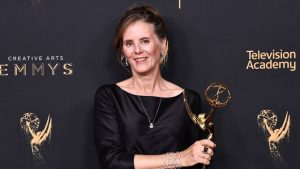
Susan Jacobs (Photo by Rob Latour / REX / Shutterstock)
Susan Jacobs
Creative Arts Emmy Awards, Press Room, Los Angeles, USA – 10 Sep 2017
The first ever Emmy Award for music supervision was handed out on Sept. 10 to Susan Jacobs for “Big Little Lies.” In a field traditionally dominated by men, particularly on the composition side, the win makes the veteran curator and former label executive a trailblazer in the craft of putting song to picture. The episode that clinched it: the finale titled “You Get What You Need,” referencing the Rolling Stones’ “You Can’t Always Gets What You Want,” which played knowingly in the background, but was sung by the artist Ituana. The show also featured a spine-tingling rendition of Elvis Presley’s “Don’t,” performed by Zoe Kravitz. Elvis’ classic “It’s Now or Never” was another highlight.
Jacobs has a distinguished resume that includes music supervision on such films as “Silver Linings Playbook,” “American Hustle” and “Little Miss Sunshine,” and TV series like Amazon’s “Mozart in the Jungle” and HBO’s “The Jinx: The Life and Deaths of Robert Durst.” Among the directors she regularly works with are Julian Schnabel, David O. Russell and Jean-Marc Vallée, who helmed all seven episodes of “Big Little Lies.”
If anything, the success of the music on “Big Little Lies” became evident when Michael Kiwanuka, who sings the show’s haunting theme song, “Cold Little Heart,” re-entered the charts as the series was airing.
As Variety reported when the Emmy nominations were announced, three of the five contenders in the music supervision category were women, a better female-to-male ratio than most other races, which begs the question: Is there a particular skill-set required of music supervision that draws so many women to the field? Or is there something more visceral — an ear for music and picture — that’s better served by a woman?
Many in the music business — as well as enthusiasts — think of music supervision as the ultimate dream job. But the responsibilities go beyond plucking and plugging songs at your whim. There are budget issues to contend with, clearances to secure, and sign-offs to gather. Licensing music to use in a visual media is an expensive endeavor and budgets for film and TV projects vary widely, but the rates to use a song — particularly a classic — usually don’t. This makes music supervision a challenge both creatively and fiscally and it requires a solid balance of left brain, right brain to do it successfully.
Certainly Jacobs has the fortitude, having worked in the field for more than 20 years — one of her first major film projects was the movie “Basquiat,” released in 1996 — and for that, her Emmy win recognizes a person who truly blazed a trail for music supervision, regardless of gender. But that so many women are thriving in the world of synchs and publishing — take someone like Songs partner Carianne Marshall or Big Yellow Dog co-owner Carla Wallace — points to a more significant mile marker, and a road ahead that looks (deservedly) open to female domination.
By Shirley Halperin
Executive Editor, Music
Photo: Susan Jacobs (Photo by Rob Latour / REX / Shutterstock)

